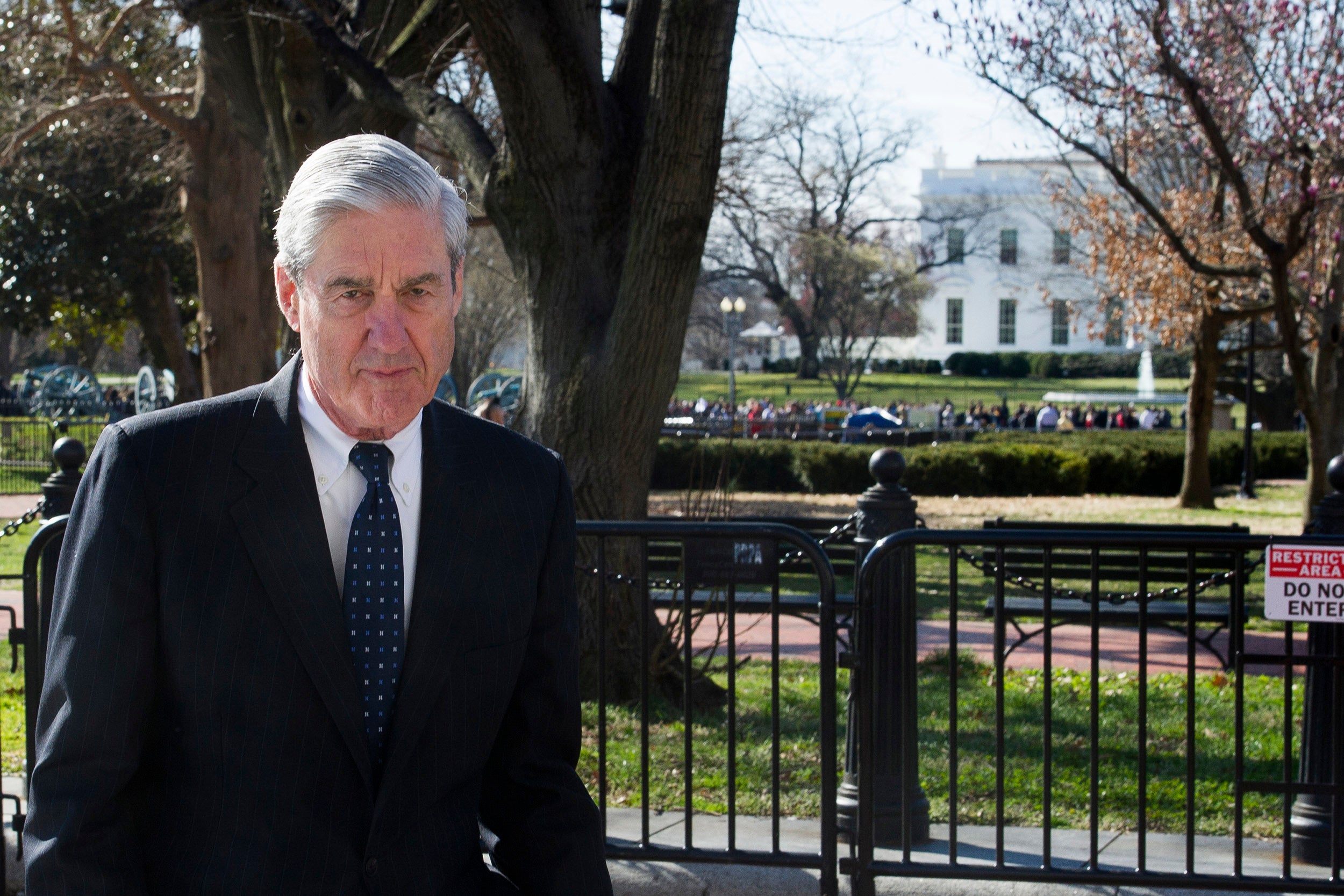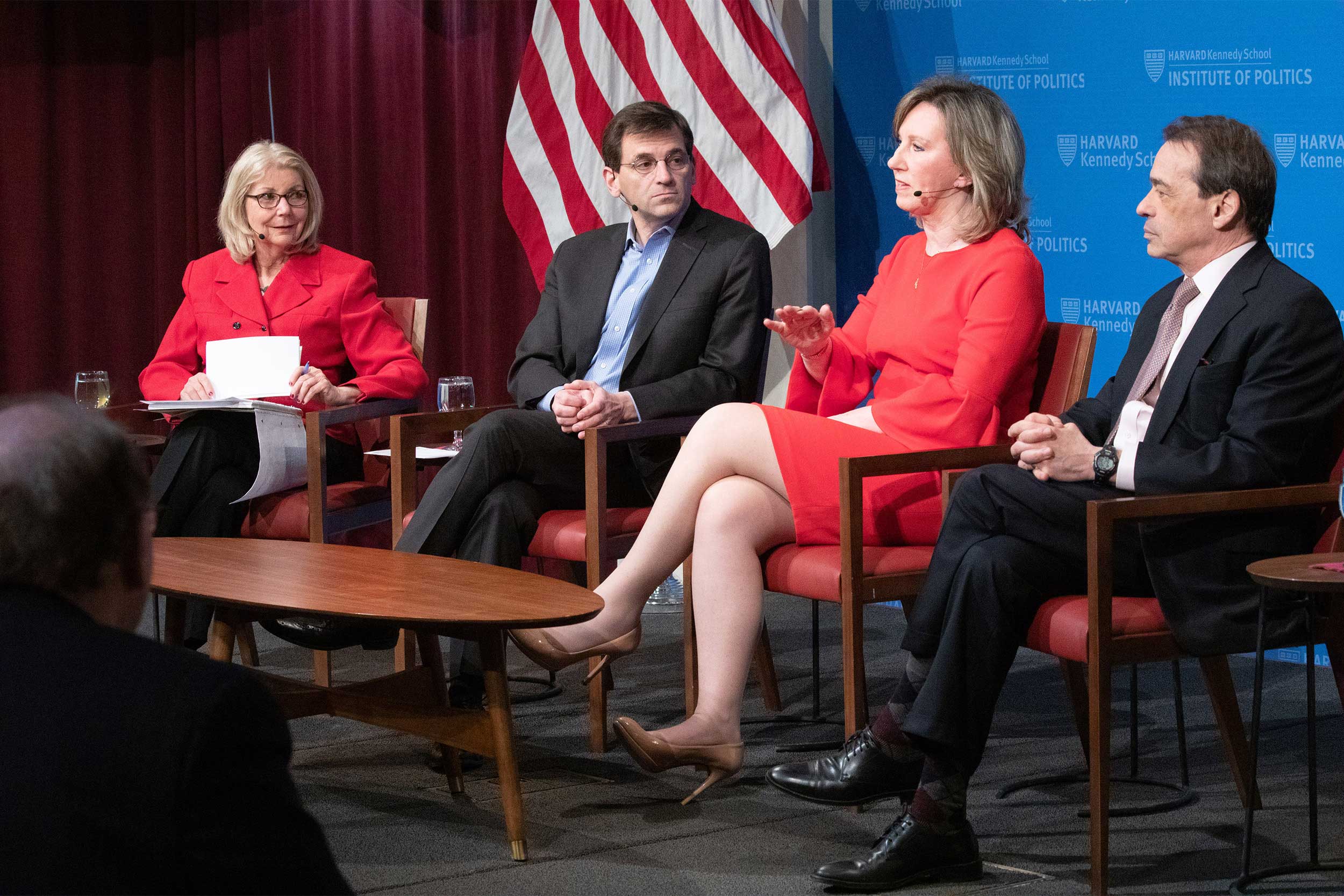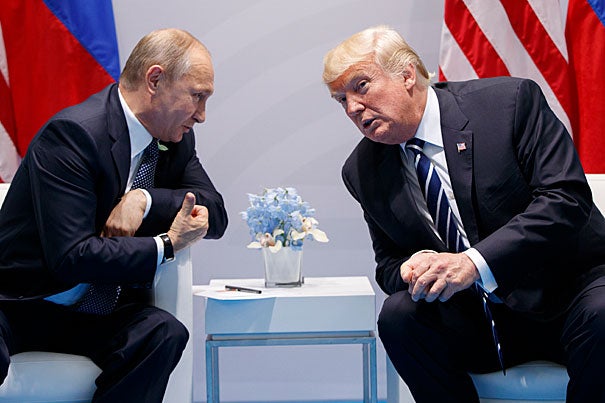
Panelists at Harvard agree that it is likely the Mueller report will be released. Special investigator Robert S. Mueller III is pictured walking past the White House.
AP Photo/Cliff Owen
Mulling the Mueller report
Findings will likely be released, panelists agree, but the question is how
Will we see the Mueller report? A Harvard panel agreed that it is likely — but that the political impact of even a full release may be limited. Meeting at the Institute of Politics on Wednesday — the day the House Judiciary Committee authorized a subpoena for the entire report — a John F. Kennedy Jr. Forum on “Presidential Investigations: What Lies Ahead” was bound to focus on the special counsel’s reportedly 400-page document.
The panel, moderated by Lynn Sweet, Washington bureau chief for the Chicago Sun-Times, brought together journalist Peter Baker, chief White House correspondent for the New York Times; CNN legal analyst and former U.S. Department of Justice official Michael Zeldin; and Barbara Comstock, the former U.S. Representative for Virginia’s 10th district.
Despite their different approaches, the panelists shared a consensus that the report will likely come out. Whether U.S. Attorney General William P. Barr will release it voluntarily or be forced to by court rulings was a point of discussion.
“I imagine there will be a dance,” said Comstock. An IOP Spring 2019 resident fellow, Comstock was one of the Republicans who decades ago investigated former President Bill Clinton and then-first lady Hillary Clinton in her role as chief counsel for the House Government Reform Committee. In supporting her position Comstock cited both her experience and her knowledge of the attorney general. “Barr is an institutionalist,” she said, “so he’s going to protect the Justice Department. But he will want to put everything out there that he can.”

More likely, Baker said, the battle will be over the redacted material. If Barr has only blacked out material “like Social Security numbers,” as he put it, the redacted report may be acceptable to Congress. But if more has been redacted, Baker expects a fight. However, there are options, such as reading redacted material “behind closed doors,” he said.
This matters, said the panelists, not only because members of Congress will want to see, and judge for themselves, the evidence that special investigator Robert S. Mueller III weighed, but because they will also want to understand the process that led to his conclusions. Specifically, said Zeldin, “I’d want to see the letter exchanges between Trump’s lawyer and Mueller’s lawyers, between Mueller and the Justice Department.” Zeldin, who is also an IOP Spring 2019 resident fellow, pointed out that even the so-called summary that has been released takes note of “legal and factual issues that do not exonerate the president on obstruction. Which means there was active debate.”
Reaching further, Zeldin said the reason Mueller did not rule on obstruction was because he may have felt blocked from fully investigating it. “My theory is that Mueller did want to interview the president but for some reason he stood down,” he said, adding, “There’s a lot to be understood even if there isn’t criminality charged at the end of the day.”
What the report’s full impact will be — or if it even has one — is unclear. “I don’t think that many minds are going to be changed,” said Comstock.
Her colleagues on the dais shared that opinion, in part, Baker said, because the goals of the report have been conflated. “We have reduced this whole thing to collusion/no collusion,” he said. The actual investigation fell into roughly two parts, he reminded us: whether the Russians interfered in our election and whether President Trump was involved. However, although Russian interference has now been well-established and is widely accepted by U.S. security services, Trump “sees this as a question of his legitimacy,” said Baker, leading him to dismiss the evidence. “If you say they had something to do with the election then you must be questioning his legitimacy,” he said.
The elision may have been abetted by the handling of the report. In a rare point of division, two of the panelists sparred gently about Barr’s actions. Comstock, who has worked with Barr, responded to an audience question by naming Barr — along with Mueller and Deputy Attorney General Rod Rosenstein — as someone who will be recalled as “one of the heroes” of this crisis.
“They had to deal with a tough hand, but these are all people who are institutional people who have a reverence for the Justice Department, and people should be encouraged that they working together,” she said.
Zeldin, however, called the four-page summary an overreach, at one point saying that Barr was “usurping authority.”
“I see nothing in the regulations that authorizes Barr to make a conclusion that Mueller didn’t make,” he said.
Looking ahead, all agreed the Mueller investigation will not affect the legal proceedings of ongoing and future investigations. It will, however, influence their political — and thus public — impact. “In terms of practical politics, the bar has been raised,” said Baker. “It is much harder for any other investigation to gain traction, as a matter of politics and in the public sphere.”
Citing previous presidential scandals, such as Iran-Contra, which failed to rise to the level of criminal prosecution, Baker tried to put the current crisis in perspective. “Does it all add up? I don’t know,” he said. “The accountability moment is going to be in 2020.”






